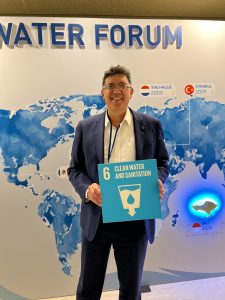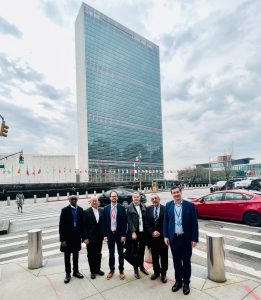 On the second day of the UN Water Conference, the WEA team again participated in plenary sessions and side events at the UN headquarters in New York. John Girgis, Permanent Representative of the WEA to the UN in New York, attended an Interactive Dialogue titled “Water for Cooperation: transboundary and international water cooperation, cross sectoral cooperation including scientific cooperation, and water across the 2030 Agenda“. The need for cooperation between neighboring countries that share water sources is crucial to the peace and security of many regions in the world since very few countries‘ fresh water resources are inside their own national boundaries. One of the overarching themes of the session was “water is rare and precious, it is the source of life and source of conflict”.
On the second day of the UN Water Conference, the WEA team again participated in plenary sessions and side events at the UN headquarters in New York. John Girgis, Permanent Representative of the WEA to the UN in New York, attended an Interactive Dialogue titled “Water for Cooperation: transboundary and international water cooperation, cross sectoral cooperation including scientific cooperation, and water across the 2030 Agenda“. The need for cooperation between neighboring countries that share water sources is crucial to the peace and security of many regions in the world since very few countries‘ fresh water resources are inside their own national boundaries. One of the overarching themes of the session was “water is rare and precious, it is the source of life and source of conflict”.
Many examples were presented to demonstrate that cooperation is possible, yet in some of the most at-risk regions, efforts have failed to bring positive results. In the latter case, an urgent call was issued for the international community to be a catalyst to bridge the gap by providing financial mechanisms, technologies, and proven examples of multilateral negotiations to implement mutually beneficial agreements. In the book of Philippians, the Apostle Paul reminds us of the need to look after the welfare of our neighbors not only our own interests. Given the dire need of water in some of the most vulnerable parts of the world, this is a principle that we can apply for the welfare of people and all of God’s creation.
Rev Allen Drew, Advocate for Creation Care at the WEA UN Liaison Office in New York, attended the Third Interactive Dialogue titled “Water for Climate, Resilience and Environment: Source to Sea, Biodiversity, Climate, Resilience and Disaster Risk Reduction (DRR).“ At this event, multiple nations spoke of the triple threat of climate change, biodiversity loss, and pollution that the world is facing. At the same time, nations consistently emphasized how interwoven water challenges are with all these issues. Good solutions on water conservation, waterway protection, and sanitation are fundamental to effectively addressing the other challenges we are facing. For this reason, multiple nations emphasized the importance of pulling water solutions out of their historic siloes and integrating them into the fabric of biodiversity, climate, resilience, and DRR policy as multidisciplinary coordinated solutions.
This dialogue as a whole spoke to the interconnected nature of the living system that God has placed us in and called us to care for (Genesis 2:15). Our role carries with it a degree of authority, but that is only as bearers of the image of a God who loves this world, calls it good, and offers it as a profound, mysterious, and daily expression of his own character (Psalm 19). In this way, our relationship with creation must be characterized most fundamentally by reverence for life, and not (as is all too common) by an orientation towards domination and control over a resource.

Creation is not a complex machine that exists solely for us to study, manipulate, and repair as needed – it is a gift from God that we are part of and are called to love. The reason we are facing these multiple environmental crises today is our orientation towards domination and control. And yet when we see things falling apart around us, we are tempted to do the same thing that got us into this mess – we try to “fix the parts” of this environmental machine, rather than participate in the holistic healing of something alive that God dearly loves. The session Allen Drew attended – and indeed water in general – is a helpful reminder that our call is not to “fix issues” and reassert our domination, but rather to remember our fundamental call to care for this beautiful creation out of our love for God. The water, climate, biodiversity, and pollution crises are not, most fundamentally, the result of poor management – they are a spiritual crisis of the heart.
In the plenary sessions, which span the entire three days of the conference, representatives from all participating countries around the world make statements and demands for better management of the world’s water resources, one after the other. Richard Kirenga, Administration and Communications Coordinator at the WEA Liaison Office at the United Nations in New York, was particularly struck by the remarks of Finland’s Deputy Minister of Foreign Affairs, Johanna Sumuvuori. She stressed the importance of building water security for all, which is a theme that resonates with several biblical passages.
For example, in the Gospel of John, Jesus said, “But whoever drinks the water I give them will never thirst. Indeed, the water I give them will become in them a spring of water welling up to eternal life.” (John 4:14) This statement illustrates the need for access to clean and safe water, which is essential for life and sustainability. Similarly, Terry Duguid, Canada’s Minister of Environment focused on global collaboration and strong bilateral and multilateral cooperation which aligns with the biblical principle of working together for the greater good.
In Ecclesiastes, it says, “Two are better than one because they have a good return for their labor.” (Ecclesiastes 4:9). In summary, the statements made by Finland, Canada and other nations at the UN water conference emphasize the importance of working together to address water scarcity and achieve sustainable development goals related to water – aligning biblical principles of collaboration, sustainability, and access to clean water for all.
 Sometimes you get surprised at UN summits, which is what happened to Dr. Chris Elisara, Co-Director of the World Evangelical Alliance Sustainability Center, this afternoon when he attended a promising session entitled “The Urban Water Catalyst Initiative: Changing the Game for Financing a Water-Secure and Climate-Resilient Future,” hosted by the governments of Germany, Netherlands, the European Union and WaterWorx. It turned out the session not only introduced what is being hailed as a groundbreaking water utility program for developing countries, but government ministers from Germany and the Netherlands signed the agreements to fund and launch the program in a short ceremony during the session.
Sometimes you get surprised at UN summits, which is what happened to Dr. Chris Elisara, Co-Director of the World Evangelical Alliance Sustainability Center, this afternoon when he attended a promising session entitled “The Urban Water Catalyst Initiative: Changing the Game for Financing a Water-Secure and Climate-Resilient Future,” hosted by the governments of Germany, Netherlands, the European Union and WaterWorx. It turned out the session not only introduced what is being hailed as a groundbreaking water utility program for developing countries, but government ministers from Germany and the Netherlands signed the agreements to fund and launch the program in a short ceremony during the session.
As Kitty van der Heijden, Netherlands Vice Minister for International development Cooperation, said as she signed the agreement; “this is not just about a program coming to life, this is about a life of dignity for women and girls, men and boys around the world that we promised them in 2015. This program can help them!” To learn more why The Urban Water Catalyst is an exciting new development for delivering clean water to millions of people worldwide, go to their website at https://www.urbanwaterci.org and decide for yourself if this new urban water initiative deserves the hype.
Karen Chong from the WEA UN New York office attended the offsite Drop of Hope side event “Interfaith Actions for Water: Challenges and Opportunities”. Michael Collins (Institute for Economics and Peace) spoke about the correlation between countries experiencing the highest levels of violence and conflict while also experiencing the most water risk and scarcity. Lillian Akwen, of ASWEDO Cameroon, spoke powerfully about the need in her country for water in schools and for clean water for hygiene, sanitation and to combat the spread of diseases.
 Although many of the statistics were discouraging, both Michael and Lillian reminded us that faith-based organizations are powerful agents for change all over the world. Michael reminded us that faith inspires us to protect our environment, and Lillian pointed out that working with religious leaders in Cameroon allows ASWEDO to reach more people and have greater impact.
Although many of the statistics were discouraging, both Michael and Lillian reminded us that faith-based organizations are powerful agents for change all over the world. Michael reminded us that faith inspires us to protect our environment, and Lillian pointed out that working with religious leaders in Cameroon allows ASWEDO to reach more people and have greater impact.
All the speakers at this event brought home the recurring theme of the UN water conference ‘Water is life’ and emphasized that our current policies are not enough to reverse the damage to the environment for the poorest people on earth. As evangelicals and followers of Jesus, let’s join together and follow the words of Amos 5:24 to “let justice roll on like a river, righteousness like a never-failing stream.”
Please follow @WEA_UN and @weasc on Twitter to get live updates from the UN Water Conference in New York.
A report from the WEA Team (WEA UN Liaison Office, New York & WEA Sustainability Center, Bonn)
